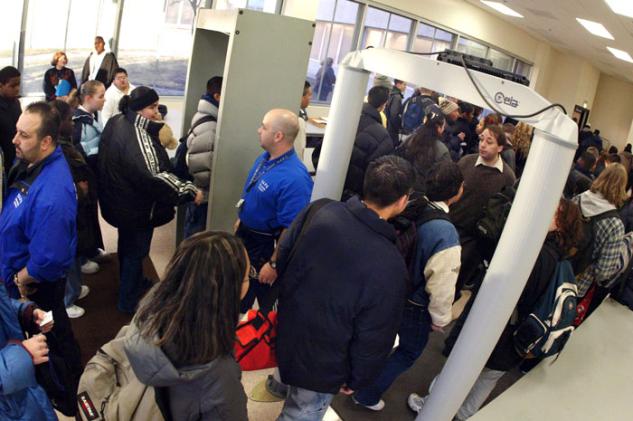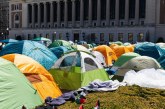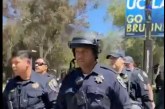 While much of the focus this week has been on the President’s plan regarding gun control and the NRA’s ad that some believe inappropriately puts the President’s daughters into the fray, concern has been expressed among civil liberties proponents about the unintended consequences of putting more police into schools.
While much of the focus this week has been on the President’s plan regarding gun control and the NRA’s ad that some believe inappropriately puts the President’s daughters into the fray, concern has been expressed among civil liberties proponents about the unintended consequences of putting more police into schools.
“Many of the presidential actions announced today are thoughtful, and the ACLU is assessing all of the proposals that have been put forth. We have several concerns about the administration incentivizing police departments and school districts to put more police officers in schools,” said Laura W. Murphy, director of the ACLU’s Washington Legislative Office said in a statement on Wednesday.
She added, “We fear that neutral sounding safety policies, such as putting more cops in school will lead to the over-incarceration of school-age children, especially students of color and students with disabilities, who are disproportionately arrested and prosecuted for issues that would normally be handled by school administrators when law enforcement is introduced into schools.”
The ACLU and others believe that Congress and the administration need “to put in place active measures to ensure non-discrimination and to protect the civil rights of young people, otherwise the results could be devastating.”
The ACLU in a release argued, “Schools should be encouraged to use funding for efforts that proactively improve learning opportunities and school climate for all students, such as training for teachers, additional counselors and health professionals, and more evidence-based programs to support students.”
“Teachers and administrators should have the ability to teach and to retain primary control over the punishment of students,” Ms. Murphy added. “Despite the president’s best intentions, funding more police officers in schools will turn sanctuaries for education into armed fortresses.”
One notable concern is that incidents such as what happened in Newtown are rare events, so while the police may be put into schools for the purpose of making them safer, the ultimate result may be the criminalization of behavior that would be better treated in other ways.
In a letter to Vice President Joe Biden, Laura Murphy and Senior Legislative Counsel of the ACLU Deborah Vagins wrote, “This tragedy has sparked a long overdue national conversation about gun safety generally and school safety in particular. However, it is important to note that gun violence occurs everywhere, and what happened in Newtown was not the result of school-specific problems.”
“We strongly caution against accepting any proposals aimed at increasing police presence in schools, which can harm educational opportunities by unnecessarily pushing students out of school and into the juvenile and criminal justice systems,” they write.
They continue, “While well-meaning policymakers might assume that adding police, metal detectors and surveillance necessarily makes students safer, experience demonstrates otherwise. In practice, most school police spend a significant portion of their time responding to minor, nonviolent infractions – children who have drawn on desks or talked back to teachers, for example – rather than behaviors that seriously threaten school safety.”
There is a good deal of research to suggest that criminalizing what is minor misbehavior, behavior that is better handled by teachers or school administrators, “has serious consequences for kids and only contributes to the school-to-prison pipeline – that is, pushing kids out of classrooms and into jail cells. When students are arrested just once, their chances of graduating drop dramatically and they face lifelong repercussions as a result.”
They write: “We must ensure that a legislative solution does not result in children being punished more severely in the name of school safety.”
The ACLU cites data from New York schools which employ more than 5000 personnel in a school security force, including permanent metal detectors. Data there suggest that of all incidents involving police personnel, 77% were considered non-criminal, only 4% were classified as major crimes against persons and only 2% were classified as major property crimes.
We can also note, closer to home, the problems that the Twin Rivers School District police have had in overextending their boundaries in search of work to do.
The ACLU notes that this is not the first time that the nation has responded to violent acts by proposing increased law enforcement in schools. In 1999, President Clinton increased federal funding for school-based police officers.
They write, “Three school districts in the Hartford, Connecticut area, just an hour from Newtown, were among the many that took advantage of this funding, and the ACLU of Connecticut examined the results.”
In the three school districts, a study found that very young students were arrested at school, including numerous children in grade three or below.
They write, “Among them, students of color were arrested at rates clearly disproportionate to their representation in the student population, and in some cases were even arrested for infractions when white peers were not.”
“Though statistics do not capture the full story, the numbers in Connecticut included the arrest of two Hispanic fourth graders for ‘insubordination,’ the arrest of an African-American first grader for ‘leaving school grounds,’ and the arrest of a Hispanic kindergartner for battery,” they add. “It is difficult to imagine any circumstances under which these arrests, rather than discipline meted out by an educator, were appropriate.”
“The disproportionate impact of over-policing and punitive school discipline policies on students of color, as well as students with disabilities, is a nationwide problem. According to national data released by the Department of Education, students of color are likely to be punished more harshly and more frequently in schools for the same infractions as white students,” they write.
The ACLU urges that these law include safeguards that include a “written agreement on the appropriate role of police involvement, limiting that involvement to serious criminal law matters only to ensure that law enforcement intervention is only used as a last resort.”
They also urge, “High-quality specialized training for all police who work in schools in such areas as youth development, non-violent conflict resolution, cultural competency, implicit bias, and interacting with students with disabilities”
The ACLU also urges data collection and reporting, reduction or elimination of federal funds in cases of overuse or racially disproportionate use of law enforcement.
In addition, they urge, “Instead of focusing on proposals that would direct even more funds towards increased school policing, we encourage you to pursue federal funding for efforts that proactively improve learning opportunities and school climate for all students, such as training for teachers, additional counselors and health professionals, and more programs to support students.”
—David M. Greenwald reporting





Typical, liberals have to make just about everything about race.
Davis quotes the ACLU that says:
> unnecessarily pushing students out of school and
> into the juvenile and criminal justice systems
Nice to see that the ACLU does not want kids who bring guns to school to enter the criminal justice systems…
> The ACLU also urges data collection and reporting,
> reduction or elimination of federal funds in cases
> of overuse or racially disproportionate use of law
> enforcement.
I wonder if the ACLU will be upset that SF spends a “racially disproportionate” amount of money investigating murders since more than 50% of the people murdered in the city belong to a race that is only 6% of the total people in the city…
http://www.sfgate.com/crime/article/Bay-Area-homicide-rate-rises-in-2012-4189892.php#page-1
Tax gun sales and ammunition to put a trained police officer into every school.
“
Nice to see that the ACLU does not want kids who bring guns to school to enter the criminal justice systems…”
That’s not exactly what the ACLU said or was concerned about. They were concerned that most of the kids the police would deal with, would not be the kids that brought guns to school, but kids that did other relatively minor things.
“I wonder if the ACLU will be upset that SF spends a “racially disproportionate” amount of money investigating murders since more than 50% of the people murdered in the city belong to a race that is only 6% of the total people in the city… “
I think the ACLU is more concerned with the fact that while whites and minorities use drugs at a relatively similar rate, minorities disproportionately end up in the legal system. I’m not sure what exactly your point is in regards to murders in San Francisco.
I guess we should never hire any more cops because they might come down disproportionately on people of race.
I think the concern, which I share, is putting police into a position to prevent a rare event creates unintended consequences. I would note that the ACLU’s solution is not along the lines you suggest, they merely suggest that we put safeguards into place to prevent the potential for abuse. I think that’s a pretty reasonable approach. You disagree?